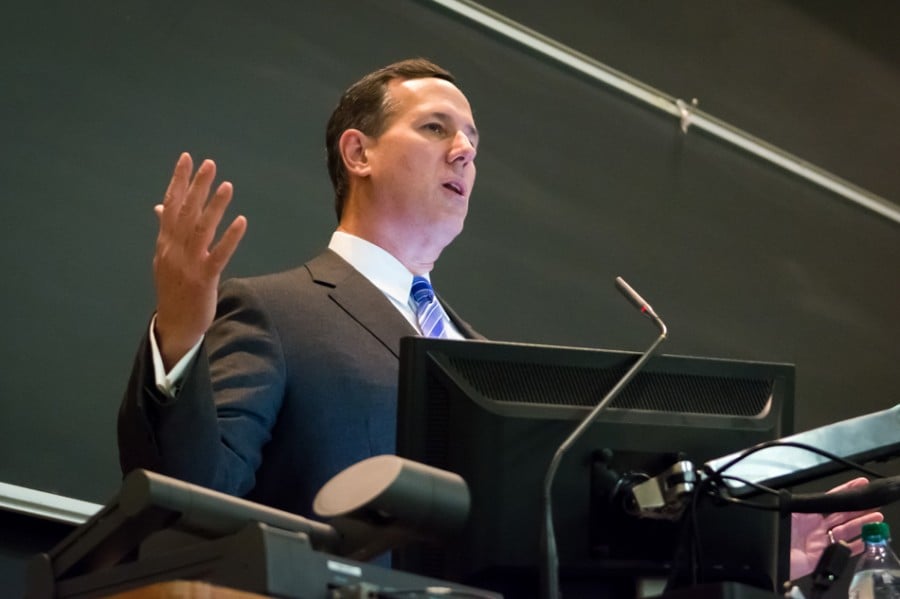Santorum draws bipartisan crowd for national security speech
Nathan Richards/Daily Senior Staffer
Former U.S. Sen. Rick Santorum speaks in Fisk Hall Wednesday night. Santorum, who ran for president in 2012, spoke on American foreign policy under the Bush and Obama administrations.
November 20, 2014
Former U.S. Sen. Rick Santorum spoke Wednesday night to more than 200 people in Fisk Hall on how America must take leadership on national security issues.
Santorum, a former Republican senator from Pennsylvania and 2012 U.S. presidential candidate, came to campus as College Republicans’ fall speaker.
He outlined four key points for successful American foreign policy. He first discussed the importance of a strong economy to support the nation’s military. He then emphasized the need for America to regain its military strength, which in turn, would serve to deter threats from other countries and lead to peace.
“We need to send out a signal to the world that we are strong, we are capable,” Santorum said. “We are in a situation that makes us much more vulnerable to foreign threats … We need to re-engage and better fund our military capability.”
Santorum’s third point was the need to understand and clearly define threats that America faces, which he said both former President George W. Bush and President Barack Obama failed to do. For example, Santorum said, the 2009 shooting at Fort Hood and other similar acts of violence should be labeled as Islamic terrorism.
“This is political correctness run amok,” he said.
In his fourth point, he said Americans deserve a definitive plan on how their interests will be accomplished, explaining that Americans do not want presidents who engage in a conflict without a clear plan for victory.
NUCR President Domonic Burke said he was pleased with the event’s large turnout, particularly by those who do not agree with Santorum’s views.
“They came and they listened to his opinion, which goes a long way in our No. 1 goal of bringing a diversity of opinion to this campus,” the Weinberg junior said. “We were really happy by all the bipartisan turnout.”
During a question-and-answer session after the speech, Santorum was asked about social issues such as abortion and gay marriage. Santorum, who is anti-abortion and against gay marriage, said he knows many disagree with his views but emphasized the importance of allowing for “informed debate.”
“I think these issues need to be played out in the public square,” he said. “Just because I disagree with you doesn’t mean I hate you.”
Santorum said, however, he does not believe abortion will be a topic of discussion 50 years from now, saying members of younger generations are more against abortion than their parents.
“I think the fact that you’re a generation that all of you could be not here,” he said. “I think that reality sits on a lot of people. You’re a very visual generation, and you’ve all seen the baby in the womb … It’s hard to say that’s not a human.”
Weinberg junior Matthew Fligiel said he thought Santorum’s speech was interesting, despite the fact he disagreed with many of the speaker’s views.
“He did make very good points about foreign policy in the Middle East,” Fligiel said, “but I didn’t agree with all of his things about mentioning Islam by name and I didn’t think it would achieve that much.”
Santorum concluded the event by expressing optimism about the future of national security policy in Congress.
“National security has been in the past and I believe can be in the future, an area to which we can begin to build bridges back between the two parties,” Santorum said. “It’s possible to get bipartisan support for a strong and principled national security approach.”
Email: [email protected]
Twitter: @tylerpager


